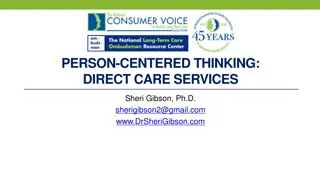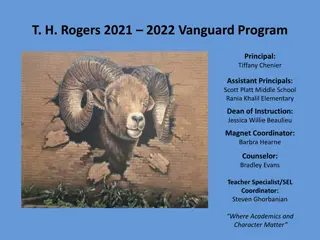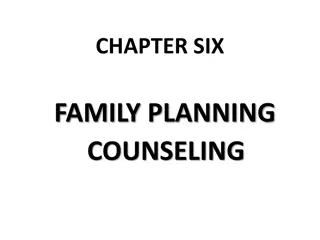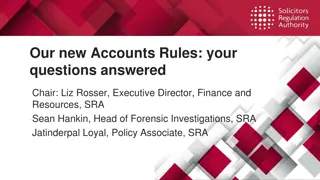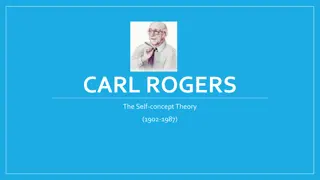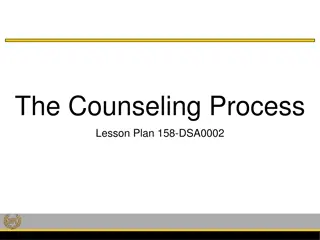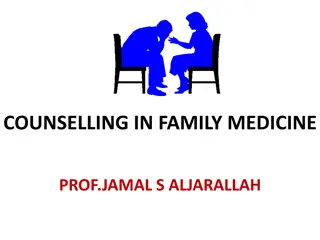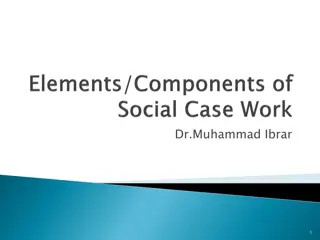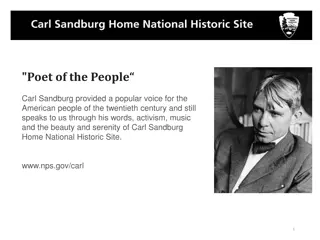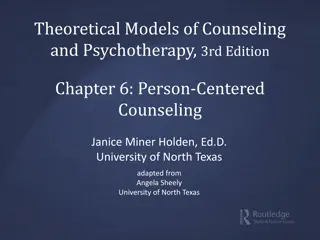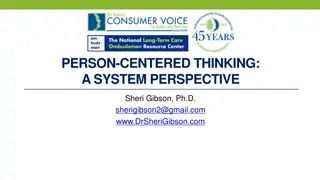Understanding Carl Rogers' Client-Centered Counseling Approach
Explore the historical overview, philosophical underpinnings, and personality development principles of Carl Rogers' client-centered counseling approach. Learn about Rogers' development of theory, his philosophical influences like phenomenology and existentialism, and key concepts such as actualizing tendency and organismic valuing process. Understand the interaction of human nature and environment in shaping an individual's self-concept and worth.
- Carl Rogers
- Client-Centered Counseling
- Personality Development
- Humanistic Psychology
- Counseling Approach
Download Presentation

Please find below an Image/Link to download the presentation.
The content on the website is provided AS IS for your information and personal use only. It may not be sold, licensed, or shared on other websites without obtaining consent from the author. Download presentation by click this link. If you encounter any issues during the download, it is possible that the publisher has removed the file from their server.
E N D
Presentation Transcript
Theoretical Models of Counseling and Psychotherapy, 4th Edition Chapter 6: Client-Centered Counseling Janice Miner Holden, Ed.D. University of North Texas adapted from Angela Sheely University of North Texas
Historical Overview: Carl Rogers Born in 1902 in Oak Park, IL Early education at Union Theological Seminary planted seeds of theory Development of theory in three phases: Nondirective phase Client-centered phase Person-centered phase Awarded first Distinguished Scientific Contribution Award by APA Died in 1987
Philosophical Underpinnings Phenomenology Creativity Actualizing tendency Existential: Alienation Anxiety Authenticity Choice/responsibility Awareness of experience in the present moment
Personality Development Nature of Humans Function of the psyche Actualizing tendency Organismic experience Organismic valuing process Self-observation/awareness
Personality Development Nature of Humans Structure of the psyche: Organismic experience Self-concept
Personality Development Nature of Humans Congruence between organismic experience and self-concept during infancy Organismic experience Self-concept Congruence
Personality Development Role of Environment Positive regard continuum: ----------------------------------------------------- Completely unconditional Completely conditional
Personality Development Interaction of Human Nature & Environment Develop need for positive regard Perceive conditional positive regard from significant others Develop inner conditions of worth: To be worthwhile, I must be X. Exaggerations Part of one s self-concept Deny to awareness experiences that contradict conditions of worth.
Personality Development Interaction of Human Nature & Environment Development of incongruence Organismic experience Self-concept
Personality Development Interaction of Human Nature & Environment Development of incongruence Organismic experience Self-concept Incongruence
Personality Development Interaction of Human Nature & Environment Unhealthy functioning: Incongruence We are all incongruent, to some degree. Deny our inner wisdom to our awareness Use rigid, unexamined values when encountering situations Feel anxiety as organismic experience is subceived Feel confusion as organismic experience sporadically breaks into awareness
Personality Development Interaction of Human Nature & Environment Healthy functioning: Fully functioning person Relatively greater degree of congruence Rely on organismic valuing process (internal, not external locus of evaluation) Open to experience all feelings Self-concept characterized by positive self-regard Values are fluid, changing as each new experience is assimilated
Personality Change Basic Principles Under certain conditions, a person can regain relative congruence and, thus, become more fully functioning: First, I allow more of my actual inner experience (o.e.) into my awareness and my sense of who I am (s-c). Then, I accept that who I am (s-c) is good enough/ worthwhile and, therefore, who I should be. Organismic experience Self-concept
Personality Change Basic Principles Under certain conditions, a person can regain relative congruence and, thus, become more fully functioning: First, I allow more of my actual inner experience (o.e.) into my awareness and my sense of who I am (s-c). Then, I accept that who I am (s-c) is good enough/ worthwhile and, therefore, who I should be (i.s.) Organismic experience Self-concept
Personality Change Client & Counselor s Role Five of the six necessary and sufficient conditions for constructive client change 1. Client and counselor in psychological contact (counselor s part) 3. Counselor genuineness (relative congruence in relationship with client) 4. Counselor s unconditional positive regard for client. 5. Counselor empathywith client s subjective experience senses client s inner world as if being the client but without ever losing the as if condition 6. Counselor success in conveying 3, 4, and 5 the core conditions to client
Personality Change Counselor s Role Counseling techniques activities: Trackclient s unfolding inner experience through Reflection of feeling Directly expressed Implied Reflection of meaning Reflection of intention/motive Reflection of discrepancy Disclosure of relevant inner experience Open-ended question (rarely) Understanding of, and response to, two types of resistance
Interface with recent developments Nature/nurture question: Interactive approach DSM 5 Diagnosis: Labels are harmful to the human experiencing and in some cases, represent conditions of worth Pharmacotherapy: Not seen as necessary, but acknowledges the best practice model for some issues Managed care and brief therapy: focus on relationship, which can take time. Improvements can be made within a caring relationship regardless of the time. Technical Eclecticism: focus on the core conditions as sufficient for change
Culture Rogers believed the core values of Client- centered theory were universal, but did acknowledge possible values conflict in some areas: Role of authority Perspective/trust in inner self
Gender and LGBTQ Issues Supportive of gender equality and the creation of a gender identity that is congruent with the self While earlier writings addressed treating homosexuality , the focus was consistently on following the client s lead and affirming their chosen path
Spirituality explicit respect for each individual s spirituality Concerned about group think mentality and thought it important that each individual have their own conception about what religion/spirituality means
Effectiveness of Therapy Empirical support for the effectiveness of the theory Difficulty being standardized, so inclusion as an evidence-based approach is unlikely Most practitioners across all theories agree that the core conditions are necessary, but not sufficient
Limitations and Contributions Limitations Some cross-cultural difficulties in applying concepts Are the necessary and sufficient condition really necessary and/or sufficient for change? Contributions Pioneered a nondirective approach to counseling Pushed Humanistic approach into mainstream psychology/counseling
References Fall, K. A., Holden, J. M., & Marquis, A. (2023). Theoretical models of counseling and psychotherapy (4th ed.). Routledge. Kirschenbaum, H., & Henderson, V. L. (Eds.). (1989). The Carl Rogers reader. Boston, MA: Houghton Mifflin. Raskin, N. J., & Rogers, C. R. (2005). Person-centered therapy. In R. J. Corsini & D. Wedding (Eds.), Current psychotherapies (7th ed; pp. 130-165). Belmont, CA: Brooks/Cole. Rogers, C. R. (1980). A way of being. Boston, MA: Houghton Mifflin.


